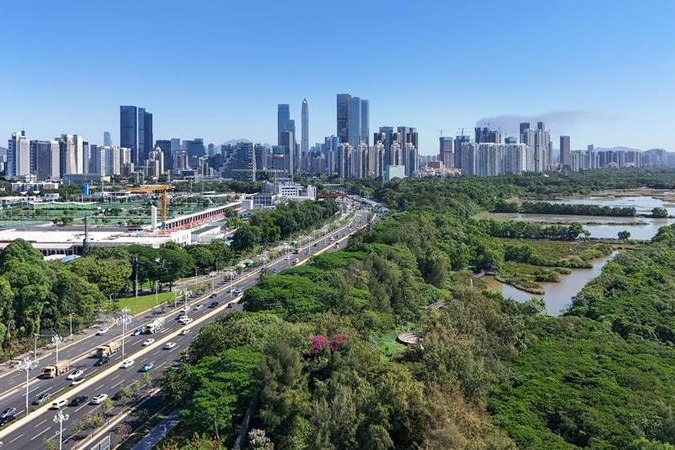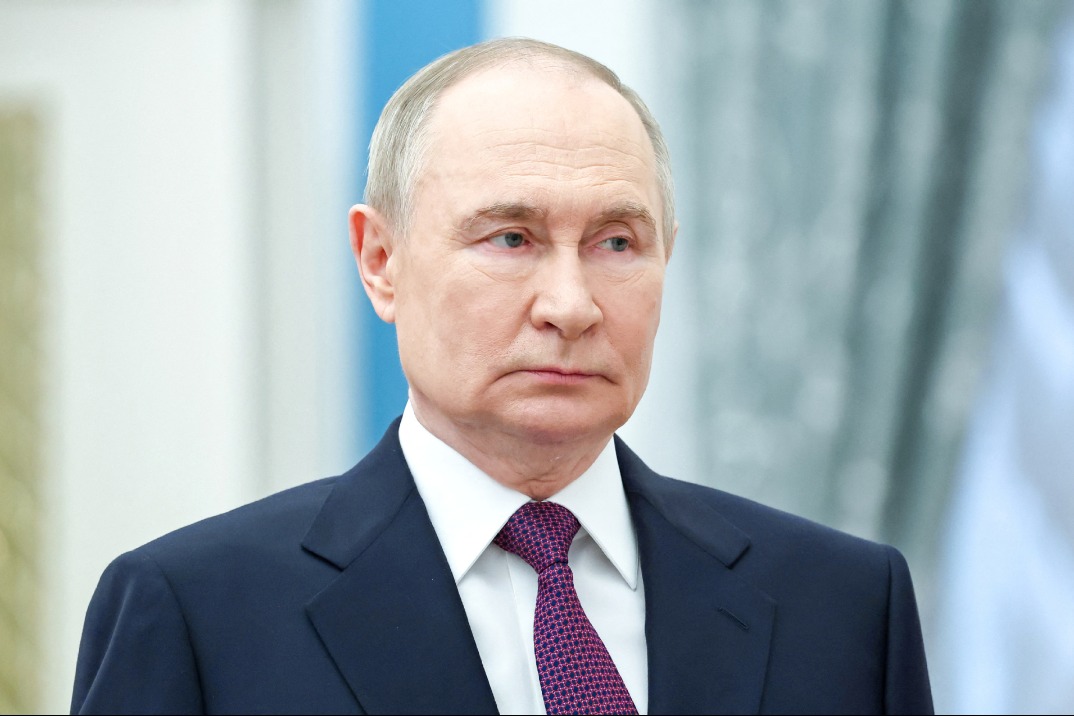Star-studded locations

Film and TV productions are luring Chinese tourists to countries involved in the Belt and Road Initiative
"This is my first trip in Hungary, but I love it more than any other country I have been to before," Joe Chen, an award-winning actress from Taiwan, wrote on her Weibo micro blog. The TV series in which she stars, Love Actually, was filmed in Budapest, the country's capital.
This was the first time a Chinese TV series had been shot in Hungary, but not the first time a show had been filmed outside China.
| Clockwise from top: Chinese stars participate in the shooting of TV show Divas Hit the Road in Turkey in 2015; A Chinese policewoman patrols in Rome, Italy, in June, to help her counterparts to protect Chinese tourists; Chinese tourists wait in line to pay at a shopping mall in Florence, Italy, in 2015; Chinese ride bikes between historical buildings through a street in Bruges, Belgium. Photos Provided to China Daily |
In the 1990s, the TV series A Native Of Beijing in New York, starring actor Jiang Wen and actress Heidi Wong, about a group Chinese people striving in New York, was China's first series to be shot overseas. The film Lost in Thailand, made in 2012, featured the beautiful scenery and local customs of Thailand, and the TV show Divas Hit the Road has visited seven countries so far in three seasons.
Previously, because of budget constraints, when a production demanded filming overseas, the production team would build a set or use a local street that could be made to look like a foreign one.
However, now that audiences expect higher standards and producers have more money, an increasing number of productions are made on location.
In 2012, a quarter of the 16 Chinese movies whose box office returns were more than 20 million yuan ($3 million; 2.6 million euros; £2.3 million) went abroad to film. The number was 12 out of 32 in 2014.
In fact, it has become a trend for TV series or programs to go abroad, especially to countries involved in the Belt and Road Initiative.
The TV program Keep Running was shot in Prague, capital of the Czech Republic, for one episode in 2017. The Chinese crew of Mr Right, a serialized love story starring actor Jin Dong and actress Jiang Shuying, spent nine days shooting in Antwerp, Belgium.
Based on the true story of Ho Feng-Shan, a Chinese diplomat in Vienna who risked his own life and career during World War II to save more than 3,000 Jews, the TV series The Last Visa went to the Czech Republic for filming to better portray the events of the time.
TV series and shows filmed in foreign locations attract an increasing number of Chinese tourists to those destinations.
"The foreign scenes that appear in movies can make me interested in visiting," says Guan Weina, who works for a TV station.
Statistics seems to confirm the popularity of foreign locations among Chinese entertainment fans.
Articles and videos on China Daily's Weibo account about Jin Dong and his presence in Antwerp to film Mr Right received a large number of reposts and likes. Their popularity can be partly attributed to Jin - but comments show that Chinese readers are also attracted to Antwerp itself, and its reputation as a world-class center for beer, chocolate, fashion, the diamond trade and its historic port and shopping streets.
Destinations on the Silk Road Economic Belt are expecting more Chinese visitors than ever before.
"The number of visitors to the Czech Republic doubled because of the Belt and Road Initiative and the signing of strategic cooperation between the two countries," says Milos Zeman, president of the Czech Republic, in an episode of Keep Running.
New destinations
Central and Eastern Europe and Russia/Scandinavia have become new tourist destinations in Europe, with the number of visitors in the first half of this year recording year-on-year increases of 151 percent and 77 percent, respectively, according to a recent report issued jointly by the China Tourism Academy, Ctrip and Huayuan Tour.
The report also says that Croatia, the Czech Republic, Austria, Denmark, Russia, Hungary, Poland, Switzerland, Finland and Italy are the top 10 markets to have developed at a rapid rate in the first half of 2017, half of them being involved in the Belt and Road Initiative.
According to another report released by Lvmama, a travel website, in 2016 the number of Chinese tourists going to Central and Eastern Europe rose by 229 percent year-on-year. Poland, the Czech Republic, Hungary, Serbia and Slovakia ranked as the top five fastest-growing destinations for Chinese tourists.
Kazakhstan became a hot spot for many Chinese fans after young singer Dimash Kudaibergen participated in the singing reality show Singer, produced by Hunan Satellite TV. Some fans said online that they wanted to see Dimash's motherland. The show didn't even film in Kazakhstan.
"I think if a series or show is filmed overseas, it will affect local tourism," says Jiang Chuan, a 25-year-old woman who majored in communication. "Programs make connections with foreign countries and they come to an agreement for mutual benefit. If the program has a big audience, the destination can definitely attract a large number of Chinese tourists."
Bigger budgets are a motivation driving production teams to travel abroad. However, people-to-people connectivity is another vital influence.
"Friendship, which derives from close contact between the people, holds the key to sound state-to-state relations," President Xi Jinping said at the opening ceremony of the Belt and Road Forum for International Cooperation in May.
People-to-people connectivity is one of the five focus points of cooperation in the Belt and Road Initiative. It ranges from tourism to arts, from business travel to educational exchanges, encouraging multiple forms of personal communication between countries that take part in the initiative.
Tourism deals
During the Belt and Road Forum, governments reached more than 200 agreements in five key areas, among them several related to tourism.
The Chinese government signed the Governmental Tourism Cooperation Agreement with Poland; the National Tourism Administration signed a tourism cooperation agreement with Uzbekistan; a memorandum of understanding on furthering tourism cooperation was signed with Chile; and an implementation plan for a memorandum of understanding on tourism cooperation was reached with Cambodia.
Promoting tourism was also the theme of the just-concluded 14th China-ASEAN Expo in Nanning, Guangxi Zhuang autonomous region.
Under the framework of the Belt and Road Initiative, China has continuously strengthened cooperation with the countries involved in the plan, making them new destinations for Chinese visitors. Countries such as Kazakhstan, Belarus and Mongolia are seeing more Chinese tourists due to promotion of the Year of Sino-Kazakhstan Tourism, a visa-free policy by Belarus and Sino-Mongolian cross-border railway day trips.
Changes in visa policies have proved particularly attractive to Chinese tourists. More than 20 countries involved in Belt and Road allow Chinese to travel without visas, or with visas provided on arrival. Nearly 10 countries have conditional visa-free travel, electronic visas and other preferential policies for Chinese visitors.
For example, Serbia has been offering visa-free access to Chinese since January. Turkey allows all Chinese tourists with a valid passport to apply for an e-visa, compared with previous years when the e-visa was only available to those who had valid Schengen Visas or visas from the Organization for Economic Cooperation and Development members. Ukraine provides Chinese travelers and businesspeople with a 15-day visa on arrival.
According to the Foreign Ministry's consular department, 26 countries or regions offer visa-free travel and 39 offer visas on arrival for Chinese visiting for business or pleasure. More are being negotiated.
As well as seeking out attractive locations, Chinese film producers are also looking to form partnerships to ensure a deeper level of cooperation with other countries.
The first Sino-Kazakh coproduction, Composer, tells the little-known story of the late Chinese composer Xian Xinghai's last years (1940-45) in Almaty, Kazakhstan's largest city, and Moscow. It has begun filming in Astana, the capital of Kazakhstan.
Zhao Ruinan and Pan Mengqi contributed to this story.
liuxuan@chinadaily.com.cn
(China Daily Africa Weekly 10/13/2017 page22)
Today's Top News
- EU has much to learn from China-Global South ties
- Key role of Sino-German ties stressed
- Xi stresses high-quality cultural-ethical advancement
- Trump halts Harvard's intl student enrollment
- Xi's visit gives impetus to our work
- Financing support enhanced for micro, small companies































